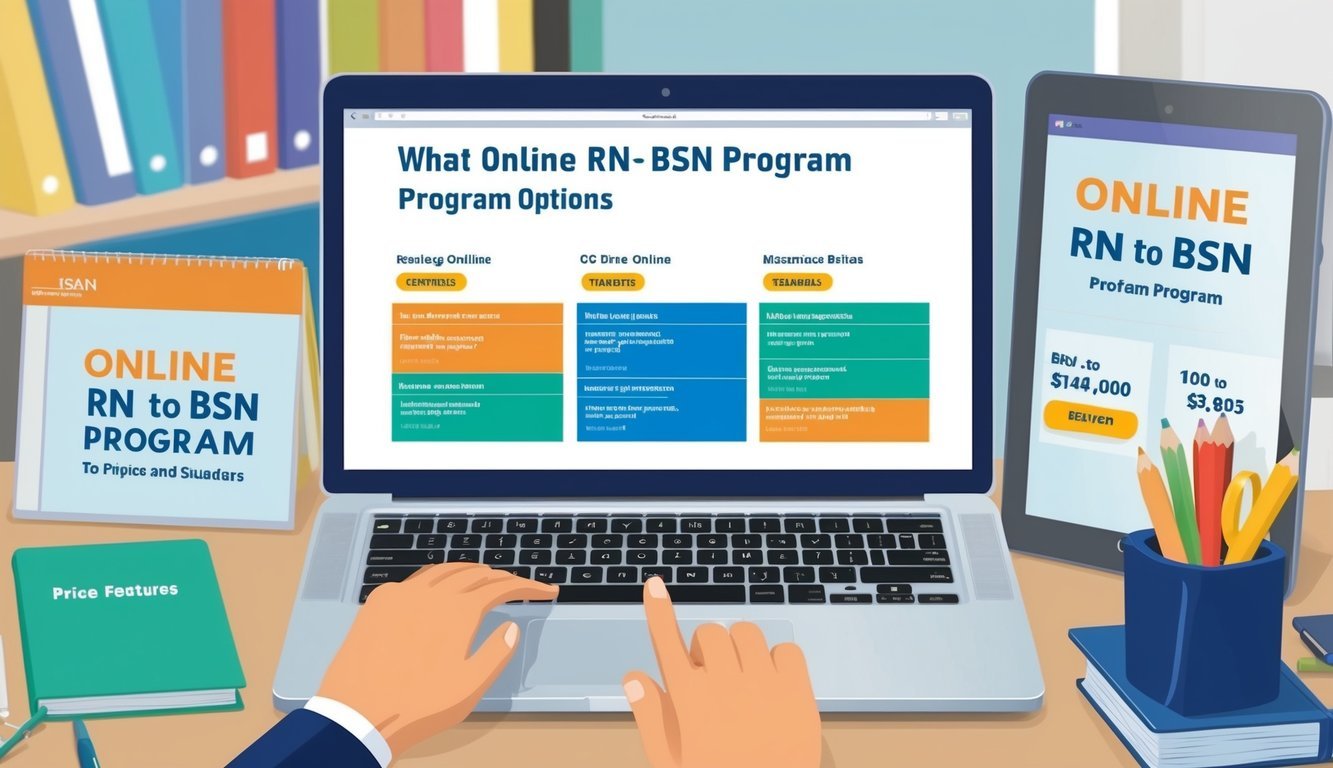Pursuing a Bachelor of Science in Nursing (BSN) is a crucial step in advancing your nursing career and enhancing your earning potential.
The cheapest online RN to BSN programs are designed to provide a flexible, cost-effective pathway for registered nurses seeking to further their education.
With a variety of options available, you can find programs that fit both your budget and your schedule, allowing you to balance work and study effectively.
These online RN to BSN programs typically vary in length and cost.
Many can be completed in as little as nine months to two years, depending on whether you choose to study full-time or part-time.
Understanding your options can help you make an informed decision about which program best aligns with your personal and professional goals, while also keeping costs manageable.
Investing in your education through an affordable online RN to BSN program not only opens doors for career advancement but also equips you with the skills necessary to provide high-quality patient care.
Explore various programs that meet your needs and help you achieve your nursing aspirations.
Check out resources like Nurse.org for a comprehensive list of the cheapest and fastest online RN to BSN programs.
Understanding RN to BSN Online Programs
RN to BSN online programs offer registered nurses a convenient pathway to advance their education.
This transition empowers you with a Bachelor of Science in Nursing (BSN) degree, enhancing your career opportunities.
What Is an RN to BSN Program?
An RN to BSN program is designed for registered nurses who already hold an Associate Degree in Nursing (ADN) and wish to obtain a BSN.
These programs typically focus on advanced nursing concepts, leadership, and community health.
Curricula may cover topics like:
- Nursing research
- Health assessment
- Leadership in nursing
- Healthcare policy
Many online RN to BSN programs allow you to complete your degree in 12 to 24 months, making them ideal for working professionals.
The flexibility of online formats means you can balance work, study, and personal commitments effectively.
Explore various options through resources like Nurse.org to find programs that fit your needs.
Advantages of Online RN to BSN Programs
Online RN to BSN programs offer several distinct advantages.
Flexibility is one of the most significant benefits, allowing you to study at your own pace and maintain your work schedule.
Other advantages include:
- Accessibility: Many programs are entirely online, removing geographical barriers.
- Cost-effectiveness: Online programs often have lower tuition costs, making them budget-friendly.
- Diverse learning formats: Courses may include video lectures, interactive discussions, and assignments that cater to different learning styles.
Additionally, earning a BSN can open doors to leadership roles and specialized nursing positions.
As the demand for BSN-prepared nurses continues to rise, you’ll enhance your employability and potential for career advancement.
Explore options that suit your goals through Forbes.
Accreditation and Educational Quality

Choosing a program that prioritizes accreditation and educational quality is crucial in your pursuit of an RN to BSN degree.
Accreditation affects the credibility of your degree, and a quality curriculum ensures you receive the education necessary for professional nursing practice.
Importance of Choosing an Accredited Program
Selecting an accredited program is vital for several reasons.
Accreditation ensures that the program meets specific educational standards recognized by institutions and employers.
Key benefits include:
- Employability: Graduating from an accredited program often improves job prospects in the competitive nursing field.
- Transferability: If you wish to further your education, credits from accredited programs are more likely to be accepted by other institutions.
- Funding Opportunities: Many scholarships and financial aid options are available only to students in accredited programs.
Understanding these aspects helps you make an informed decision about your education pathway.
Commission on Collegiate Nursing Education (CCNE)
The Commission on Collegiate Nursing Education (CCNE) is a recognized accrediting body that evaluates nursing programs.
Programs accredited by CCNE demonstrate a commitment to quality education that aligns with current nursing practices.
When assessing RN to BSN programs, check if they are CCNE accredited.
Accreditation by this body indicates that the program:
- Meets high standards in curriculum, faculty, and student services.
- Prepares you effectively for professional nursing practice.
- Engages in continuous quality improvement based on ongoing evaluation and feedback.
This accreditation reflects a dedication to advancing nursing education and practice.
Curriculum Standards
The curriculum of an RN to BSN program plays a vital role in your education.
Quality programs should offer a blend of theoretical knowledge and practical skills.
Typical curriculum components include:
- Nursing Theories: Understanding foundational theories that guide nursing practice.
- Research Methodologies: Learning about nursing research to improve practices and patient care.
- Leadership Training: Preparing for leadership roles within healthcare settings.
Ensuring that a program has a comprehensive curriculum aligned with current practices and standards is crucial for a successful transition to BSN-level practice.
Evaluating Costs and Affordability

Understanding the costs associated with pursuing an online RN to BSN degree is crucial for making informed decisions.
Tuition rates and available financial aid options significantly impact your overall affordability.
Tuition Rates and Program Costs
Tuition rates for online RN to BSN programs can vary widely.
Many of the cheapest online RN to BSN programs offer rates ranging from $200 to $350 per credit hour.
For example, Florida International University charges an average of $237 per credit, while in-state students at some institutions may pay as low as $350.06 per credit hour, compared to out-of-state students who might pay more, like $644.65.
Typical program costs for obtaining a BSN generally range from $10,000 to $20,000.
The length of these programs can affect overall expenses, with most requiring between 30 to 60 credits for completion.
Programs with accelerated tracks may provide additional cost savings by allowing you to finish sooner.
Financial Aid and Nursing Scholarships
To help offset costs, explore various financial aid options and scholarships.
Numerous nursing scholarships are available specifically for RN to BSN students.
Many affordable RN to BSN online programs offer financial aid packages that include grants, loans, and work-study opportunities.
Resources such as the American Association of Colleges of Nursing and local nursing organizations provide lists of scholarships for nursing students.
Conducting thorough research can help you find suitable options to reduce your educational expenses.
Additionally, check if your employer offers tuition reimbursement as part of your benefits.
Career Outcomes and Advancement

Advancing your education from an RN to a BSN can significantly impact your career trajectory.
This transition opens doors to various roles within the healthcare industry, enhances your earning potential, and prepares you for leadership positions.
From RN to Advanced Nursing Roles
Earning a BSN can qualify you for advanced nursing roles that require deeper clinical knowledge.
Positions such as Nurse Educator and Case Manager often require a BSN as a minimum qualification.
In these roles, you can influence patient care standards and contribute to nursing education.
According to recent data, BSN-prepared nurses have opportunities in specialized fields, such as pediatrics and critical care, which can lead to an enriched career experience.
Increased Earning Potential
One of the most significant advantages of obtaining a BSN is the potential for higher earnings.
On average, BSN-prepared nurses earn $7,000 to $10,000 more annually than their ADN counterparts.
Here’s a brief comparison table of average salaries:
| Nursing Credential | Average Annual Salary |
|---|---|
| ADN | $63,000 |
| BSN | $70,000 – $73,000 |
These figures can vary based on location, specialization, and experience.
The investment in a BSN program often pays off in the long run through increased salaries and job stability.
Leadership and Management Roles
With a BSN, you may qualify for leadership and management roles within healthcare settings.
Positions such as Nurse Manager or Director of Nursing require skills in managing staff and overseeing patient care.
You will be involved in strategic planning and implementing policies that enhance patient outcomes.
Training in leadership areas prepares you to take on responsibilities that affect the entire nursing team, providing you with a pathway to elevate your career within the healthcare industry.
Selecting the Right Online RN to BSN Program for You

Choosing the right online RN to BSN program requires careful consideration of several critical factors.
Understanding these elements will help ensure that your educational experience meets your personal and professional needs.
Factors to Consider When Choosing a Program
When selecting an online RN to BSN program, consider the program’s costs, length, and accreditation.
Programs may vary in price significantly, so it’s essential to evaluate tuition fees, which can range from $66 to $408 per credit at institutions like the University of Central Florida and Florida International University.
You should also assess the length of the program, with many taking between 9 months to 2 years to complete.
Acceleration options can affect your decision based on your current workload and availability.
Make sure to check if the program is online or requires some in-person attendance.
Student Support and Resources
The support and resources available to online students play a vital role in your academic success.
Ensure the program offers academic advising, tutoring services, and access to online library resources.
Institutions like Florida Atlantic University provide extensive resources for their students.
Look for programs that offer dedicated online orientations to familiarize you with digital learning platforms.
Additionally, consider if there are opportunities for networking, peer collaboration, or mentoring.
Programs that prioritize student support can significantly enhance your learning experience.
Program Outcomes and NCLEX Pass Rate
Investigating program outcomes, particularly NCLEX pass rates, is crucial in selecting an online RN to BSN program.
A high pass rate reflects the program’s effectiveness in preparing students for licensure exams.
For example, Georgia Southwestern State University provides relevant statistics on their NCLEX pass rates, allowing you to make informed decisions.
Generally, aim for programs where the NCLEX pass rates exceed the national average, which indicates strong academic support and curriculum quality.
Student-to-Faculty Ratio and Faculty Credentials
The student-to-faculty ratio can significantly impact your learning environment.
Smaller ratios often mean more personalized attention and support from instructors.
Programs such as those offered by University of Texas at Arlington might showcase favorable ratios that allow for better interaction.
Review faculty credentials to ensure you’re learning from experienced professionals in the field.
Faculty members with advanced degrees and practical experience can enrich your education and provide valuable insights into real-world nursing challenges.
Investigate faculty backgrounds through program websites to ensure you’re receiving quality instruction.

